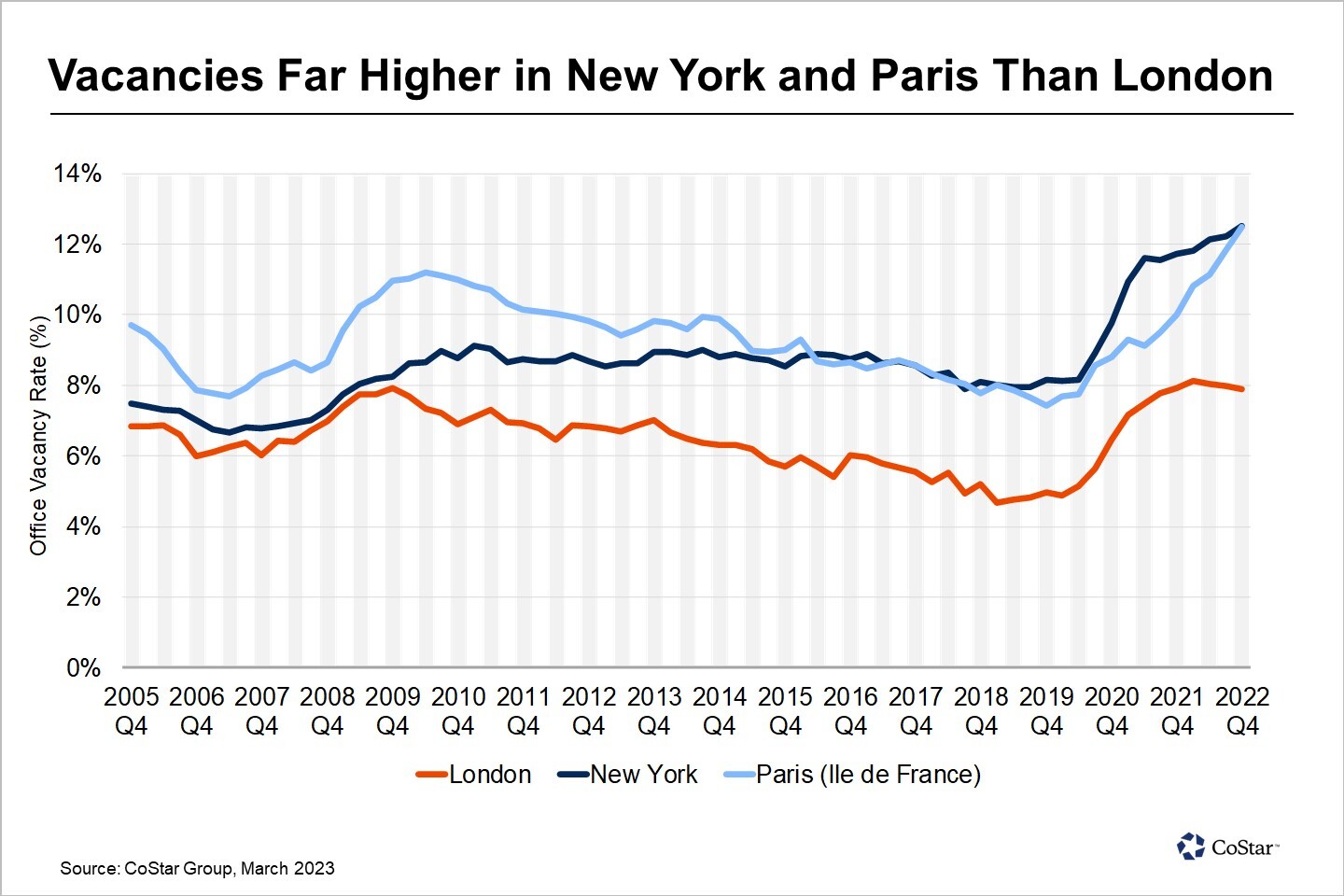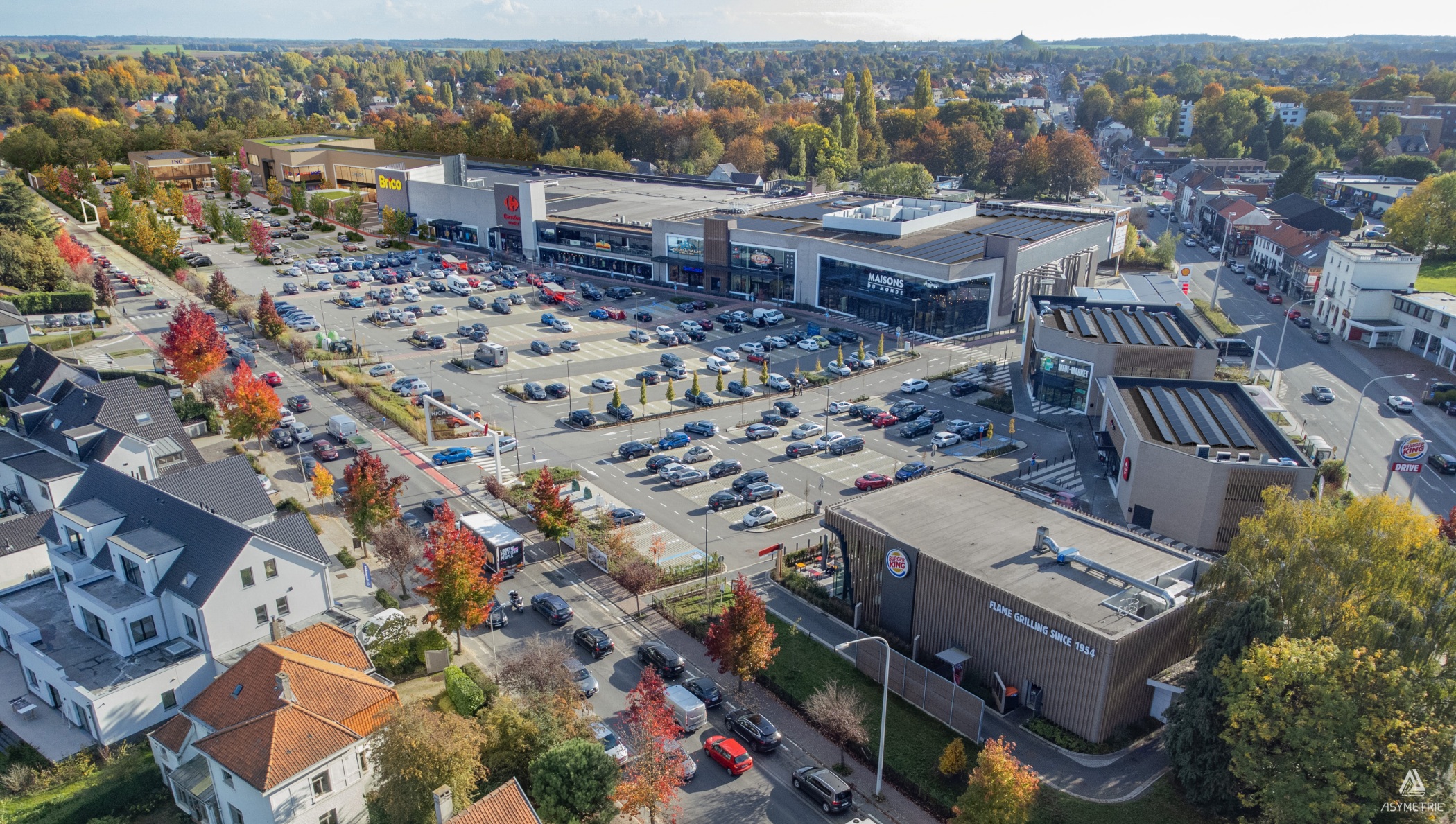This year's edition of Mipim, the world's largest real estate conference, in Cannes in the South of France, started cautiously enough as participants sought clarity on any number of issues that are holding back dealmaking and activity.
But if facing up to a higher inflation and interest rate environment were the key topics in meetings on a windy and chilly Tuesday, by Wednesday concern was spreading about a potential banking crisis in Europe and its impact on real estate as Credit Suisse's share price collapsed.
By Thursday the sun had come out, participants were taking heart from central bank and government commitments to safeguard the financial markets, and real estate was again looking forward to recovery and how it will emerge from this latest cycle.
"There is an old adage that fortunes are built in down markets and collected in up markets," said James Sparrow, chief executive of Savills in the UK. "The timing of Mipim in the context of the current market is interesting. Whilst I accept the current challenges, I am less bearish than others and believe there will be opportunities during the rest of this year in pretty much all sectors. Outside the box and lateral thinking is the order of the day in this market and those that do that will do well.”
By the end of the event Thursay, Nicolas Kozubek, its director, could confirm to CoStar that there had been more than 23,000 delegates, a big move towards the kind of figures it saw before the pandemic. And attendees were not just the major brokers and global investors and their most senior staff, but two senior French ministers, the UK's minister for investment, and even a sprinkling of celebrities such as former Manchester United footballer Gary Neville and England World Cup winning rugby star Matt Dawson.
Necessarily, a principal talking point has been repricing as interest rates have risen across the globe.
Roger Clarke, chief executive of IPSX, the first dedicated exchange to provide a place for trading shares in companies owning and managing individual commercial property assets, found a silver lining in the particularly strong price falls in the UK.
"We have seen three years worth of price correction in a very short space of time, so this is very different from the [Great Financial Crisis] and I think at Mipim you see it has been good for the market. Valuers have moved very quickly in the UK and people are ready to act."
IPSX began the week by confirming it has listed four separate companies with either a single commercial property or portfolio of assets. He revealed to CoStar that the exchange was now in talks with the Financial Conduct Authority about listing real estate bond issuance and debt on the exchange too. "We think that will particularly appeal to institutions," he added.

Dealwise, there was less to report than previous years as European markets remain muted, but the transactions that did emerge were highly significant. In particular, Newmark confirmed its acquisition of Gerald Eve in the lead up to the event, as revealed by CoStar News in August, and the company's senior partner Simon Prichard was in town to talk about how he hoped the tie-up would lead to major growth across Europe.
CoStar News also broke the news of a bellwether major regional transaction in the UK, as Praxis enters talks to buy Birmingham's landmark Brindleyplace office estate for more than £150 million.
Signature Transactions and Pricing
Colliers UK and Ireland CEO Tony Horrell said a number of recent deals, such as the Halo office transaction underway in Bristol, were acting as important signposts for the market. "That is a signature transaction pointing to a depth of bidders for strong assets, and to that bifurcation between the most prime and other assets we are seeing."
Richard Womack, head of West End capital markets at Cushman & Wakefield said, echoed the feeling that the market was becoming more comfortable with value falls: "It is very difficult to forecast if we are at the bottom for pricing but deals are happening even though they are taking longer. Occupancy has been robust take-up wise and if that holds up than there could be a relatively early move back to more normal levels of transactions and we could have a really good end of year."
Chris Lewis, head of office investment, national capital markets, Colliers, said the UK does appear to be moving more quickly to a situation in which deals will happen whereas other countries in Europe have been slower to respond to value falls. "That is particularly the case in the sheds [or industrial] market where there is evidence of gazumping again," Lewis said. Gazumping is when a second buyer comes in at a higher price than the first, confirmed buyer and takes the property from under the latter's nose.
Richard Garside, head of central London at Savills, said there was more and more evidence of investors looking at opportunities. "We have been involved in a number of transactions at the start of the year, which is enabling us to move on with [other] transactions."
Banks and Jitters
The week started with some discussion of the impact of the collapse of the US's Silicon Valley Bank and whether that would affect Europe. By Wednesday as Swiss bank Credit Suisse found itself at the centre of a major share price collapse, the entire industry was trying to work out whether it could be another black swan event for the banking sector and real estate.
On the Tuesday, IPSX's Clarke was sanguine about the troubles facing the US regional banks. "SVB is not the [Global Financial Crisis], we have tighter regulation now and there is an unusual exposure to just one thing in technology here [at Silicon Valley Bank]."
Colliers' Horrell said the market remained fragile and the developing news was unhelpful for that reason. "The news on the GDP growth we are seeing in the UK is good but the market is skittish and it only takes one thing such as the SVB failing to give it the jitters. Someone once said when the tide goes out you discover who was swimming naked and I think that has been happening. But 70% of our business is not transactional." That would leave Colliers less at risk if deals stop.
Jochen Schenk, chairman and chief executive of Real IS, which last year sold €1 billion of properties and bought €600 million, said there are buying opportunities in the market, but there is no need to buy right now. Schenk said the fund manager is looking at ways to increase its assets under management by managing properties on behalf of other investors.
He said many investors have taken to the sidelines given uncertainty about the economy and rising interest rates. He said the bailout of US banks Silicon Valley Bank and Signature Bank had given property investors hope that interest rates would not be hiked further for now.
“If the whole disaster has one advantage, it shows that whatever it takes to tame inflation is not without collateral damage."
By Thursday, as Swiss financial regulators had stepped in to safeguard Credit Suisse, and the UK chancellor of the exchequer Jeremy Hunt had confirmed in his Budget address that the government had worked over the weekend with HSBC on a deal to buy the UK arm of SVB for £1, the industry was feeling more confident that this was not another banking-led recession in the making.
Stephanie Hyde, UK chief executive at JLL, said: "In terms of the banking concerns, clearly it has been important the central banks stepped in. This is not a Lehman's moment."

Simon Stone, of central London investor and developer Stone/RE, was looking at the opportunities it could spawn: "There might be a few more forced sellers now I think as the banks are under more pressure, and for us that means opportunities. We are now talking about how to help landlords and real estate owners with financing pressures. The thing in property is you buy long-term income and then over time it becomes short-term and the building needs cosmetic and [environmental, social and governance] work for occupiers and investors now. It is no longer just a lick of paint. But we will only build BREEAM Outstanding developments now," a reference to an environmental sustainability accreditation that stands for Building Research Establishment Environmental Assessment Methodology.
Mark Rose, chief executive of Avison Young, said the headlines around SVB and Credit Suisse cast a reminder about the importance of public policy.
"When office assets are struggling globally, for instance, and you are talking about funding investment and development it does not help. But what has been very positive is we see that recovery will lead from the public sector which can light a match and then the private sector can run with it. We have been seeing and piecing together constructive dialogues between public and private sector."
Rose said there is major interest particularly in residential and affordable housing, industrial, life sciences and data centres. "And a lot of the conversation has been around what comes next as you come out of this particular cycle. I think cycles are getting narrower and shorter but of course we do need to get banks lending and the major investors in the US, for instance, are still focusing on the triage of concerns over offices and how they will be occupied. We do need to get the private sector fully investing but the thing is the money is there, they just need to get to grips with various regulatory and capital accounting factors and bank lending."
Return to the Office
Offices remained a major topic of conversation at Mipim, and how they will be occupied after lockdowns prompted a shift by some to working from home.
Flexible office group IWG's Dixon said, while the office was very much alive and well, leases would need to be far more flexible for occupiers, and buildings would not survive if they depended on tenants requiring a long and difficult commute time.
Avison Young's Rose said reporting on the phenomenon remained too narrow. "The return to the office is not just a COVID or a commute issue, it is complex. In some areas crime is playing a part too, certainly in the US where people don't want to travel into the office for that reason sometimes. Cities need to work with the private sector on how they can be safer and show people they are safer.
"But I am very positive about it in the long term. I think as an example, though it is clearly not the same, after the tragedies of 9/11 there was two years when no one wanted to be in a city office or tall building and businesses invested hugely in safety and security. And then slowly people came back and dipped their toes in to being in offices, and within five years everyone had returned. No one had forgotten what had happened obviously but they embraced offices again. I see a similar five-year pattern following the pandemic. People are just more productive in the office. And you will see people thinking, I did not get that promotion because I was not visible to senior management in the office, for instance."
Jon Gardiner, head of central London leasing at Savills, said he was optimistic about London offices as the capital is structurally under supplied at present.
"The political and economic events of the last 12-18 months has largely paused much of the forward development pipeline and therefore the market will be structurally undersupplied over the coming years. A combination of restricted availability and the emergence of 'prime' office space – a better version than Grade A – is resulting in landlords holding their nerve and commanding higher rents.

"These 'prime' schemes are, of course, superbly located in terms of public transport and local amenity but the buildings themselves are pioneering in their approach to net-zero carbon, health and wellbeing and the adoption of smart technologies.
"It certainly pays to go the extra mile, with our analysis showing a rental premium of 14% for buildings with roof terraces. Whilst these trends are undoubtedly the future of office design, in the West End submarkets of Mayfair and St James's where there is 2%-3% vacancy, you don't need to have ticked every box to still deliver the highest rents given the exceptional high demand from, amongst others, the finance industry. But demand isn't limited to the core, across the whole of central London there is 9.3 million square foot of active demand still – 6% up on the long-term average."
Nick Penny, head of Scotland at the firm, said: "Well-located efficient buildings in the Scottish centres will do well as there is little supply. Out-of-town retail has been doing very well in Scotland too."
Simon Williams, head of investment UK, BNP Paribas Real Estate, said in some ways with higher inflation and higher rates the market is back to normal at Mipim. "We are back to good old-fashioned property fundamentals like asset management."
His colleague and co-head of national investment Hugh White said crucially the occupier story remains robust in many locations. "There is a compelling rental story in Oxford and Cambridge, for instance, where rents are hitting £60 per square foot for non lab space. It is different in the US which is lagging Europe on the return to the office in some ways."

Fergus Keane, head of central London investment at BNPPRE, said the market had been spooked by the banking troubles, but the silver lining was there is less likelihood of base rates rising and debt might become cheaper. "And that might put some pressure on people to do deals. If you are buying a building at a 4.75% yield and the borrowing cost is 5% there is a negative arbitrage but that could change now. I am very positive about core product in London, looking at the occupational story and where prices are now. And I am a big believer in luxury retail and have huge conviction on Oxford Street where you will see a lot of concessions from the closed department stores that need to take space there."
JLL's Hyde, said people were sharing notes on pricing at Mipim, enabling the market to shift. "We are seeing things happening already and it is leading to movement. And you hear lots of ideas from people here about how they will make money — one person will be focused on the living sector, another on hotels. There has been a lot of energy in the UK markets as well as a huge focus on [environmental, social and governance] and the green premium as well as brown discounts and even brown penalties now."
Opportunity Knocks
There were, as always, many in town promoting new roles, new business takeovers or new strategies. Several people mentioned the conference's "energy", and many seemed to want to move forward from a difficult few months.
Stone/RE's Simon Stone said a clear positive for developers and investors was signs that build cost inflation was slowing down.
"In terms of our quantity surveyors, they are saying that build costs may only see moderate growth this quarter and then may start to fall back with for instance the price of steel falling. That will make a huge difference in the market."
Melanie Collett, head of asset management at Aviva Investors, said the conference had been about how the industry needs to act quicker and more certainly. "I think it is really about moving on from talking to doing now. I will take a lot back from the conference."
- article9 Min ReadMarch 16, 2023 10:49 AMLocal leaders discuss investor appetite amid economic headwinds.
- article1 Min ReadMarch 16, 2023 07:06 AMCoStar News and sister publication Business Immo team up to quiz the leader of the region around Paris.
- article2 Min ReadMarch 16, 2023 06:20 AMParters commit to Joint Venture To Improve Birmingham's Knowledge Quarter
- article1 Min ReadMarch 16, 2023 05:49 AMThe IWG chief executive says commuting is 'one of the craziest inventions of the last 100 years' and on the ropes anywhere it is long, inefficient and expensive.
- article2 Min ReadMarch 16, 2023 05:10 AMMoney is not an issue for the US property owner and developer after Stone Point Capital became involved last month.
- article2 Min ReadMarch 15, 2023 06:10 PMGlobal markets were rattled by the big bank's troubles, prompting attendees at the Mipim property conference to ponder the impact on their industry.
- article1 Min ReadMarch 15, 2023 10:55 AMYoung is moving from London as group looks to double in size across the region.
- article1 Min ReadMarch 15, 2023 08:37 AMJames Porter moves from managing director - occupier solutions.
- article1 Min ReadMarch 15, 2023 07:07 AMCity centre site is destined for mix of housing units and sits close to railway station.
- article2 Min ReadMarch 15, 2023 06:48 AMExperts cite North East's Newcastle Helix scheme as an example of successful city centre regeneration around higher education.
- article1 Min ReadMarch 15, 2023 06:18 AMHorrell also talks to CoStar News about sector opportunities, getting deals done and how the Chancellor could help business growth.
- article5 Min ReadMarch 14, 2023 09:36 AMVacancies have stabilised at lower levels in London but yields are rising.
- article3 Min ReadMarch 14, 2023 09:21 AMCushman report warns that a combination of factors means landlords must act now.
- article2 Min ReadMarch 14, 2023 07:32 AMDeal includes 64% of stake in Icade Santé and Icade Healthcare Europe's portfolio of assets.
- article1 Min ReadMarch 14, 2023 05:41 AMThe commercial and residential agent is launching a dedicated BTR division at the real estate conference.
- article2 Min ReadMarch 14, 2023 05:02 AMThe duo has teamed up with transport group Ascendal to announce the plans at the Mipim conference.
- article13 Min ReadMarch 13, 2023 10:25 AMCristina Garcia-Peri, senior partner and head of strategy and corporate development at Azora, catches up with CoStar News.
- article1 Min ReadMarch 13, 2023 06:20 AMThe transaction for the Pullman Cannes Mandelieu Royal Casino has completed as the world's biggest real estate conference gets underway in the city.
- article2 Min ReadMarch 13, 2023 05:38 AMThe acquisition of a majority stake in Germany's Redos enables it to create a huge retail warehouse park portfolio.
- article4 Min ReadMarch 12, 2023 07:56 AMThe UK minister for investment, a US economics star and Amanda Staveley to be among speakers as 23,000 prepare to descend on Cannes for the world's largest real estate conference.


























